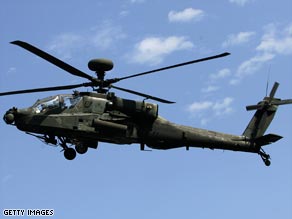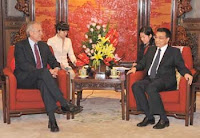Taiwan arms deal sours U.S.-China relations
In a foreign military sales program, the US has sold Taiwan $18.3 billion worth of weapons between 1950 and 2006.
By Jonathan Adams posted October 06, 2008 at 10:00 am EDT
Washington's approval of nearly $6.5 billion in arms sales to Taiwan Friday drew a relieved "thank you" from the self-governed island nation, but sharp rebukes from Beijing.
The Bush administration on Friday notified Congress of the deal, after an unusually long delay that had led some to question the strength of the US security commitment to Taiwan.
Taiwan has not yet purchased the weapons. But a Congressional notification is the point in the arms sales process that triggers a storm of official Chinese diplomatic protests, said Mark Stokes, a former top Pentagon official dealing with China and Taiwan, in a talk to the Taiwan Foreign Correspondents Club earlier this year.
China typically summons top US diplomats in Beijing and elsewhere for a sharp dressing-down immediately after such notifications, Mr. Stokes said.
According to Xinhua, China's state-controlled news agency, the foreign ministry this time summoned the US embassy's charge d'affaires in Beijing.
The report cited a statement on China's foreign ministry website. Foreign Ministry spokesman Liu Jianchao said the Chinese government and people firmly opposed this action which seriously damaged China's interests and the Sino-US relations. ...
"It is only natural that this move would stir up strong indignation of the Chinese government and people," he said.
Meanwhile, the Associated Press (AP) reported that Taipei welcomed the news. Taiwan's president, Ma Ying-jeou, took power in May on a platform of improved commercial ties with China. But he also wants to maintain a robust defense in order to counter China's military buildup across the Taiwan Strait. On Saturday, Taiwan's Presidential Office spokesman Wang Yu-chi thanked the U.S. and said the government wants to maintain a strong defense against any threat from China while seeking improvement in cross-strait relations.
"President Ma Ying-jeou would like to express gratitude to the U.S. for the arms package," said Wang. "A strong defense and peace in the Taiwan Strait are necessary for Taiwan's prosperity."
China views Taiwan as rebel territory and vehemently opposes any US arms sales to the island. The US is bound by domestic law to make available to Taiwan sufficient weapons for its self-defense.
Further complicating the issue, Taiwanese themselves cannot agree on the nature and extent of the threat from China. Their bickering held up Taipei's arms request for several years, amid legislative gridlock.
Some of the arms approved for sale Friday were initially offered by the Bush administration in 2001. Taiwan purchased and received several of those systems, notably four Kidd-class destroyers.
The approved weapons are only about half of what Taiwan requested, in dollar terms.
Washington gave the green light Friday to sales of Apache attack helicopters, Patriot missile batteries and other air defense systems, and fighter jet spare parts. But it reduced the number of Patriot batteries and missiles offered, and continues to sit on a request for Black Hawk helicopters and a submarine feasibility study.
The US also continues to ignore a separate request by Taiwan for 66 advanced F-16 fighter jets. Security analysts say Taiwan urgently needs those jets in order to maintain a balance of air power over the Taiwan Strait. One such analyst was quoted by Singapore's Straits Times in July: Professor Lin Chong-pin of Tamkang University, who was formerly Taiwan's vice-defence minister, told The Straits Times that with the rapid modernisation of China's People's Liberation Army (PLA), 'Taiwan's last remaining edge in air supremacy would be gone if the F-16s are not coming'.
The weapons cleared for sale Friday represent a massive layout, even if they fell short of Taiwan's wish list. Citing US government statistics, Bloomberg noted that Taiwan received $18.3 billion in weapons under the US Foreign Military Sales program in the entire period of 1950 to 2006.
The arms deal is likely to draw far more attention in China than in the US. Last year, a survey on public attitudes toward US-China relations found that Taiwan was the No. 1 concern for the Chinese public. For Americans, however, the top worry was job losses to China – showing the gap in priorities and perceptions between the two big powers.
Chinese Communist Party propaganda has reinforced popular sentiment that Taiwan is an inalienable part of China that must one day be returned to the "motherland," by force if need be. That reunification is seen as a last bit of unfinished business in China's transformation from humiliated victim of colonial predations to global power.
Meanwhile, Taiwan continues to consolidate its young democracy under the shadow of China's military threat. Numerous polls, including those published by the Election Study Center at Taipei's National Chengchi University show that a solid majority of Taiwanese want to maintain the island's political autonomy.
http://www.csmonitor.com/2008/1006/p99s01-duts.html




 Reply With Quote
Reply With Quote






Bookmarks